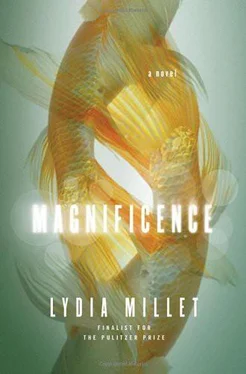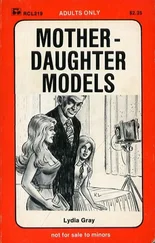But then he stayed shy, downcast eyes and an expression of regret or modesty, hard to tell which. She guessed he was ashamed of them, that their behavior nagged at his Catholicism. Maybe the age difference made him awkward, maybe she reminded him of his mother. She would prefer not to. Younger men were a recent event for her, a passing accident. Usually it was competence that attracted her to men more than the way they looked, and older men were more likely to be competent, though they didn’t have a monopoly on it. Baseball had been almost incompetent, which made him less than compelling in the end. Ramon was not; Ramon had competence enough to give solidity to his attractiveness. Also he did not have a girlfriend — she had asked — and so she was unsure where his regret came from, save maybe shame about pleasure.
She always tried to meet shame gracefully where she found it, felt sympathy for those who believed that pleasure deserved punishment (although she herself even suspected it sometimes, more superstitiously than anything). She felt the sadness of this inheritance, religious, social, even a casual hand-me-down, and tried small tender gestures to soften the exchange. Often she suspected these gestures were only perceptible to her, though — too subtle or subjective to convey.
They were surrounded by clarity in the Himalayas — the snow-topped mountains in two dimensions, the robin’s-egg skies above. Around the king bed was a menagerie: the goat-like animal labeled BLUE SHEEP, the otter, the cat whose glass irises were a deep-spiraling well of gold. She turned her head to the window. Inside the square were power lines and palm trees and above these a yellow-gray haze of smog. The brief white frame divided those elements from the painted landscape of the peaks — one of which she was almost sure was Mount Everest, another K2, because she knew the shape of them from movies. She wondered if the old man had done this, lain on this very bed when he was young. The animals blindly seemed to watch; in former days, possibly they had watched him. The animals did not watch, of course — dead they were blind — but still they seemed to. You watched but did not seem to; they saw nothing while seeming to fixate on you. .
She shivered. Do not look at the cat, do not think of old fur. Of skinning, of tanning, what happened to the real eyes. Someone had skinned these creatures once, someone had flayed their bodies raw. In Century City the lawyer sat behind his desk and hissed: He died without issue . She closed her eyes for a time, but to look at Ramon she had to risk the sheep in her peripheral vision. Its horns were symmetrical, rounded, rising from the head in graceful arches — but even this was a distraction, even this brief observation was not what she meant to be doing, seemed like a form of disrespect.
Then the condom came off and Ramon was embarrassed. She slid her hand around it and disposed of it onto the floor, rummaged in the nightstand drawer for a new one. She smiled at him while she reached for the packet, the smile always a key to continuity: she struggled to maintain the grace they’d had, smooth over his humiliation, struggled to do so without the appearance of struggling. Men could be sensitive to interruption.
She wondered what he made of the house, the moth-eaten mounts everywhere. The new condom went on and they were off and running. . the old man’s library contained books on taxidermy. Apparently aficionados called the animals mounted , not stuffed — both about sex, of course — the beasts, the prey, the caught, the shot. Ramon knew the place was new to her, that these were not her oddities but someone else’s, inherited along with the house. That much she hoped, at least, from the fact that he was here working for her in the derelict garden, if not from passing remarks she’d made. If he’d listened.
Suddenly in her mind she was an old woman in a rambling house full of pelts. Nothing could be less appealing. And yet Ramon did not notice this sour flash of identity. He showed no outward sign. He did what he did. Here he was.
She pushed the pelts to the back of her mind, closed her eyes again and tried to feel her fingertips, her toes, the long glide of her legs over the backs of his. He said something under his breath, a compliment, she thought — it sounded like You’re beautiful —and she appreciated the kindness but doubted that he meant it. It was not true; she knew she was not beautiful but attractive at best, the kind of woman few men noticed unless she wanted them to. She had a symmetrical face and a graceful, smooth body, once you got her clothes off — her body was still better than her face, even in middle age — but overall she had quiet looks.
She tried to forget the details of herself. She would be no one — Let me be no one at all or all of them. Let me be anyone. That was the privilege of the rich, wasn’t it? They could feel like anyone, where the poor could only feel like themselves, trapped in themselves forever. The rich were infinitely free. Or the suddenly rich, at least. Those born that way were bound and tied, as much as anyone. But the manna from heaven. . let us lift off the bed, let our skins absorb the streams of particles, of blood, water, the electricity, the storms—
She washed the smell of latex off her hands afterward and ran a shower for Ramon in the adjacent bathroom, whose tilework must have dated from the twenties: they were minute one-inch ivory tiles trimmed in black and a powdery pink. A large, rusting showerhead over a clawfoot tub.
She said to herself, almost aloud: Never again. Next time she slept with a stranger it would be in her own room, where all that watched them was the long, flat grass.
Ramon clearly felt pressed to get back to work, though the whole episode hadn’t lasted more than twenty minutes and fit into his morning break. He stepped out of the shower and stood beside her, watching from the bathroom window as his supervisor arrived, pulling into the driveway beneath them in his white van with a logo of black leaves.
“You can say I made you do something for me,” she said, handing him a towel. “I mean, if you want to. You can say I made you carry something heavy.”
•
It let her feel regal to stroll through the house out into the back gardens. Laughable — an emperor with no clothes — but still real. The rooms were cleaner now, the gardens tidied and replanted where they had died, trees and bushes pruned, ponds repaired and refilled, irrigation systems patched and put on an expensive timer. She picked out fish from a catalog. She spent her days clearing the house of what she knew she didn’t need — at first only the small debris of the old man’s life, gathered combing through drawers. There were scores of well-used packs of playing cards, held together with rubber bands and bearing an unmistakable old-card smell, the ancient dirt of fingers. There were board games, as though families had come through here frequently despite his having been a bachelor, despite his having died without issue.
She found Parcheesi, a game she remembered from summer nights in her grandmother’s house. She found ashtrays by the score, glass with seams of bubbles along the edges or in the shape of French poodles, plastic printed with fading beer or tobacco logos, thick clay slabs with crude scallops and the denting prints of children’s thumbs. She found a shelf full of faded badminton birdies and wooden tennis racquets, a worn football, croquet mallets. Somehow these conjured parties for her: elegant guests in evening dress with cigarettes in long holders, spilling out onto the patios and gardens in a gleaming night.
The furniture was dingy, and there was too much of it: every space was a hodgepodge of styles and colors. She had the ruined and homely pieces removed and watched with satisfaction as the rooms they left behind became airier. She loaded knickknacks into boxes and drove them to Goodwill; she scrounged through cabinets until they contained only items for which she could imagine some future use.
Читать дальше












